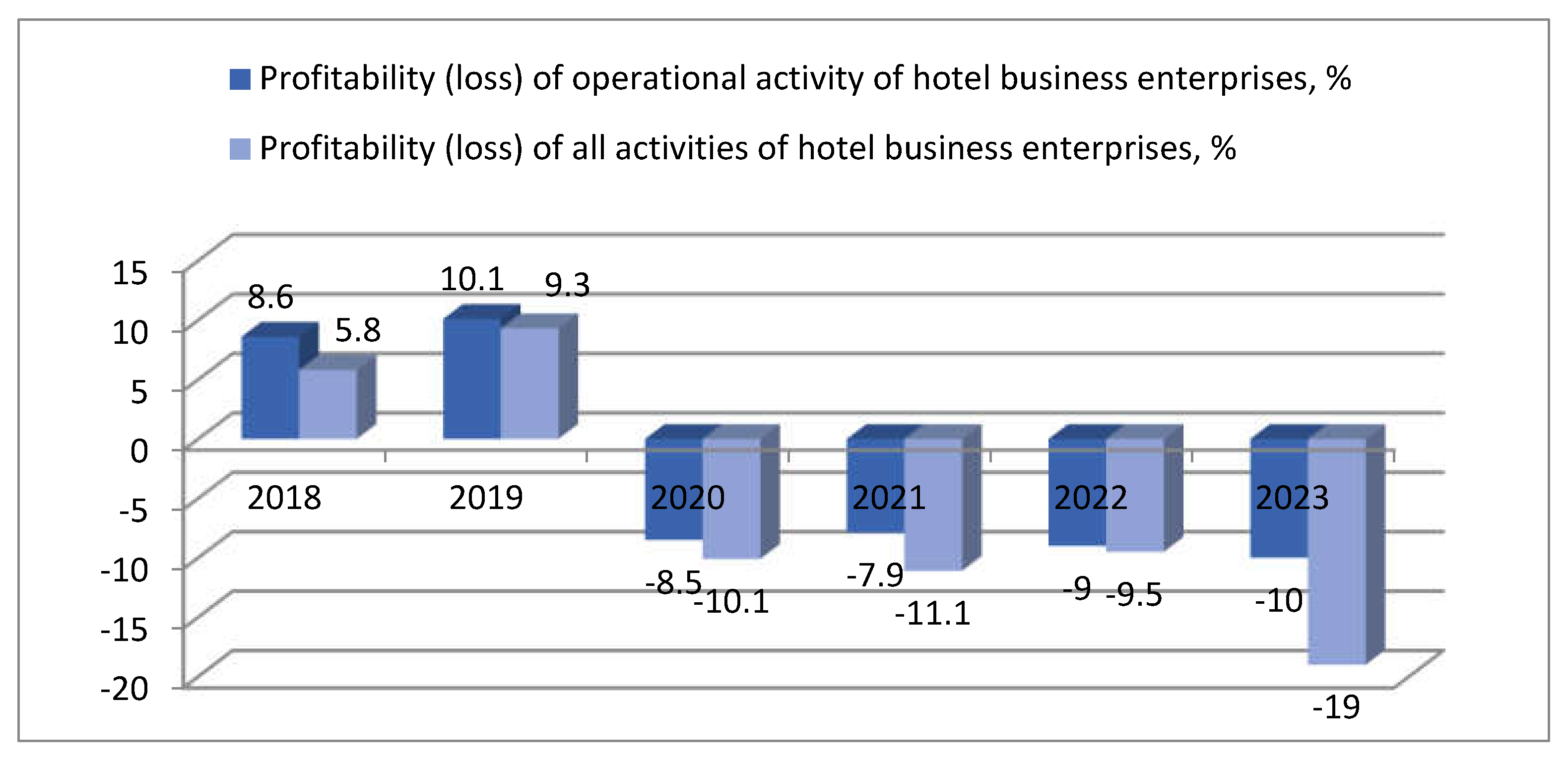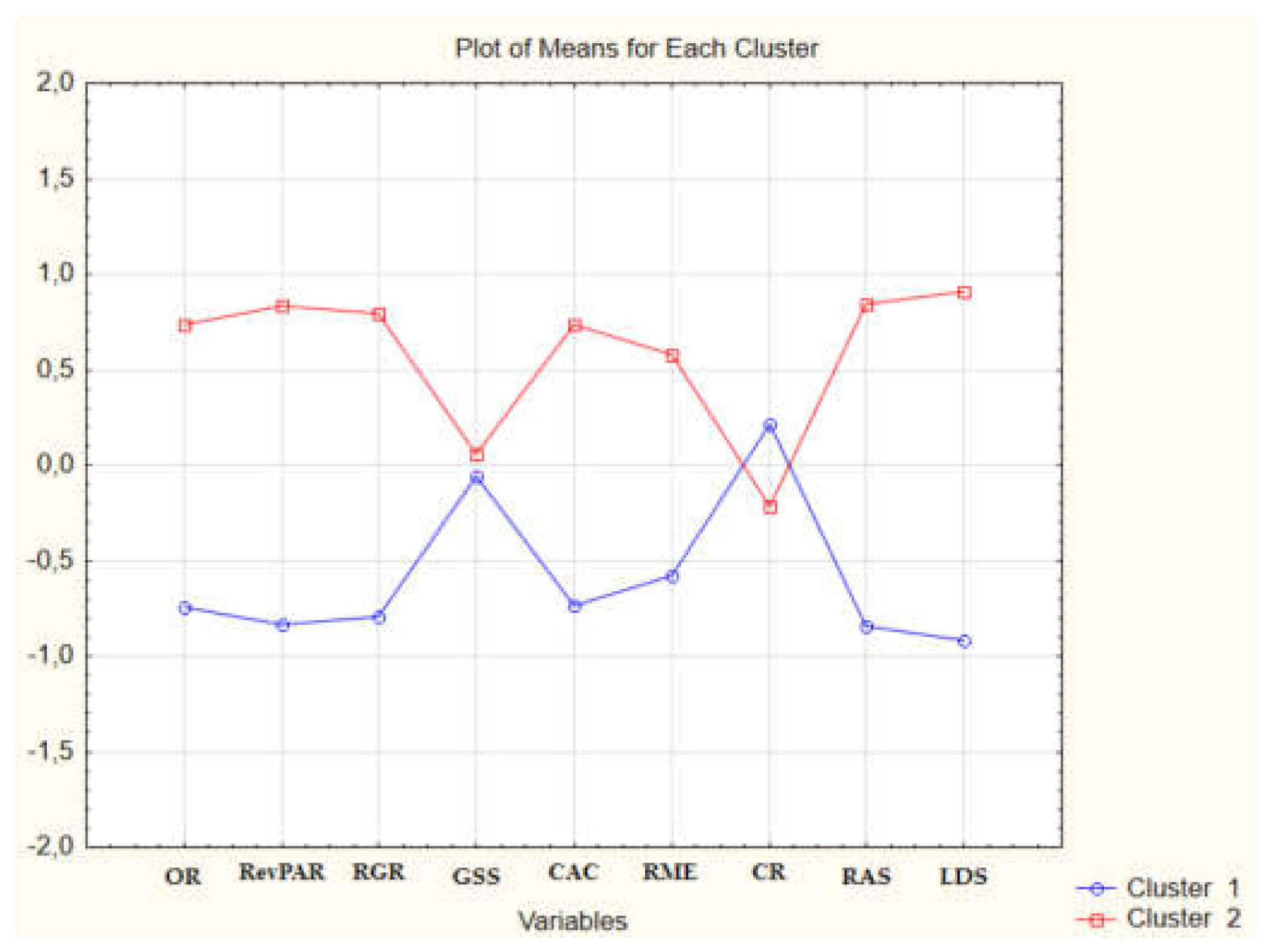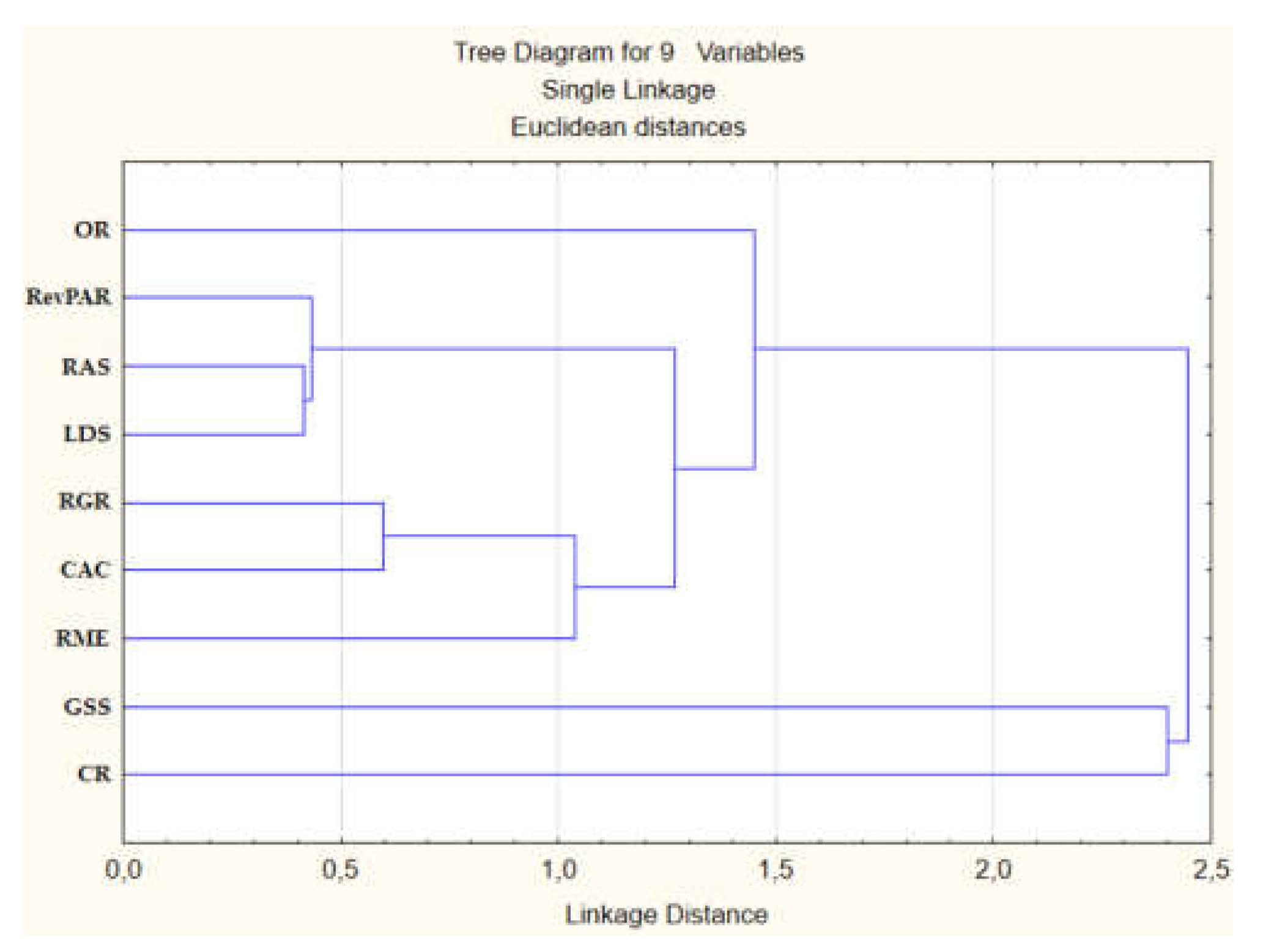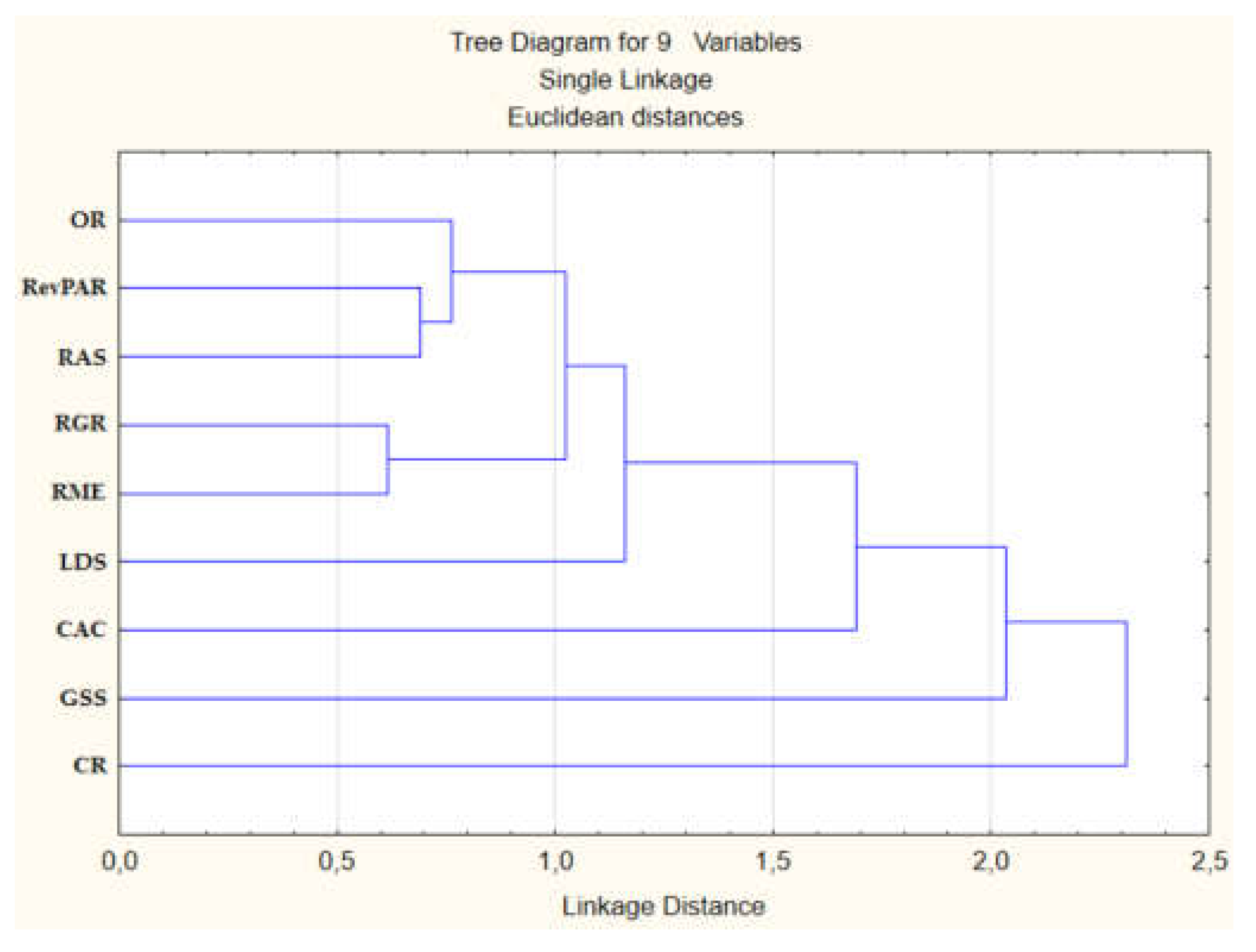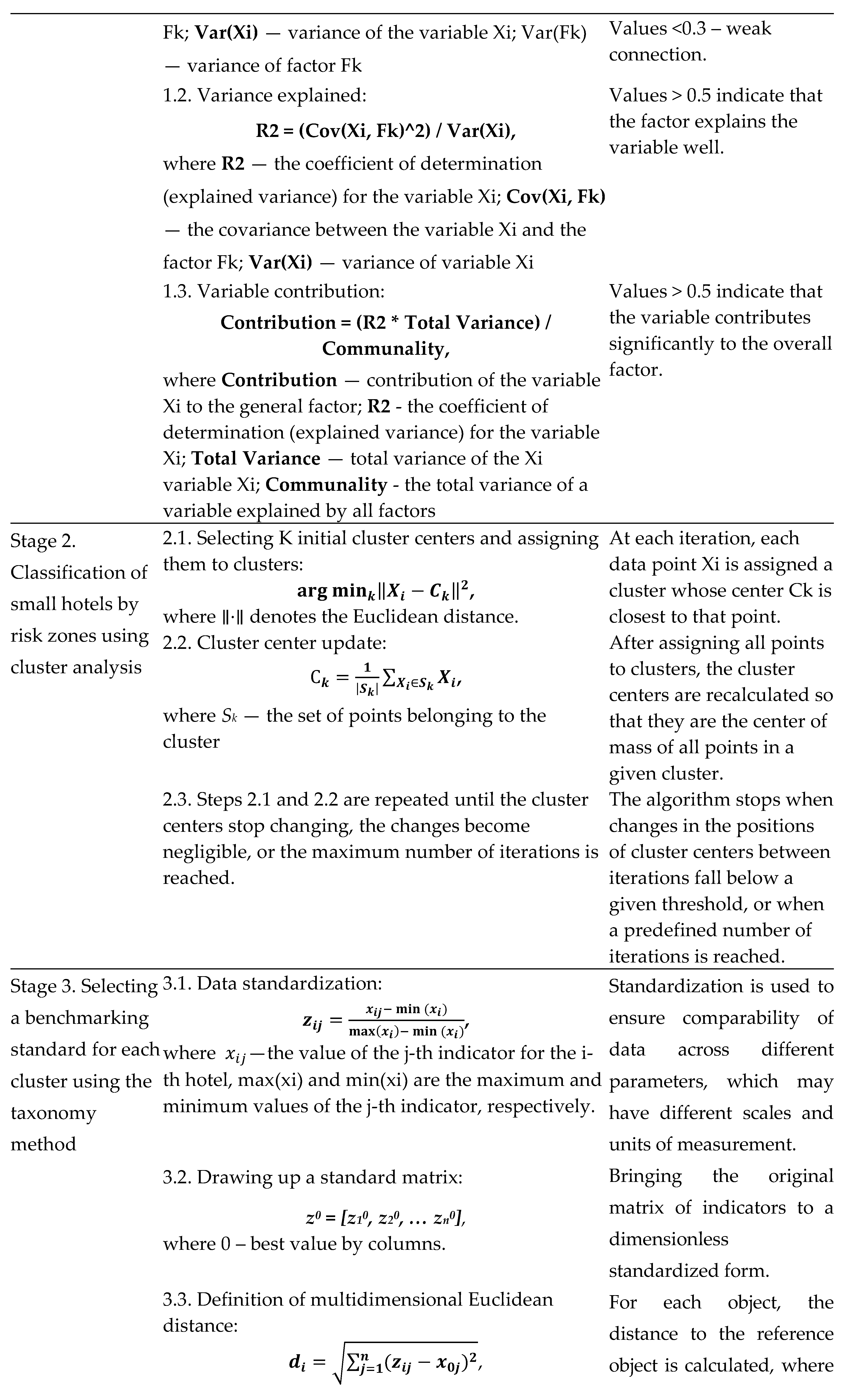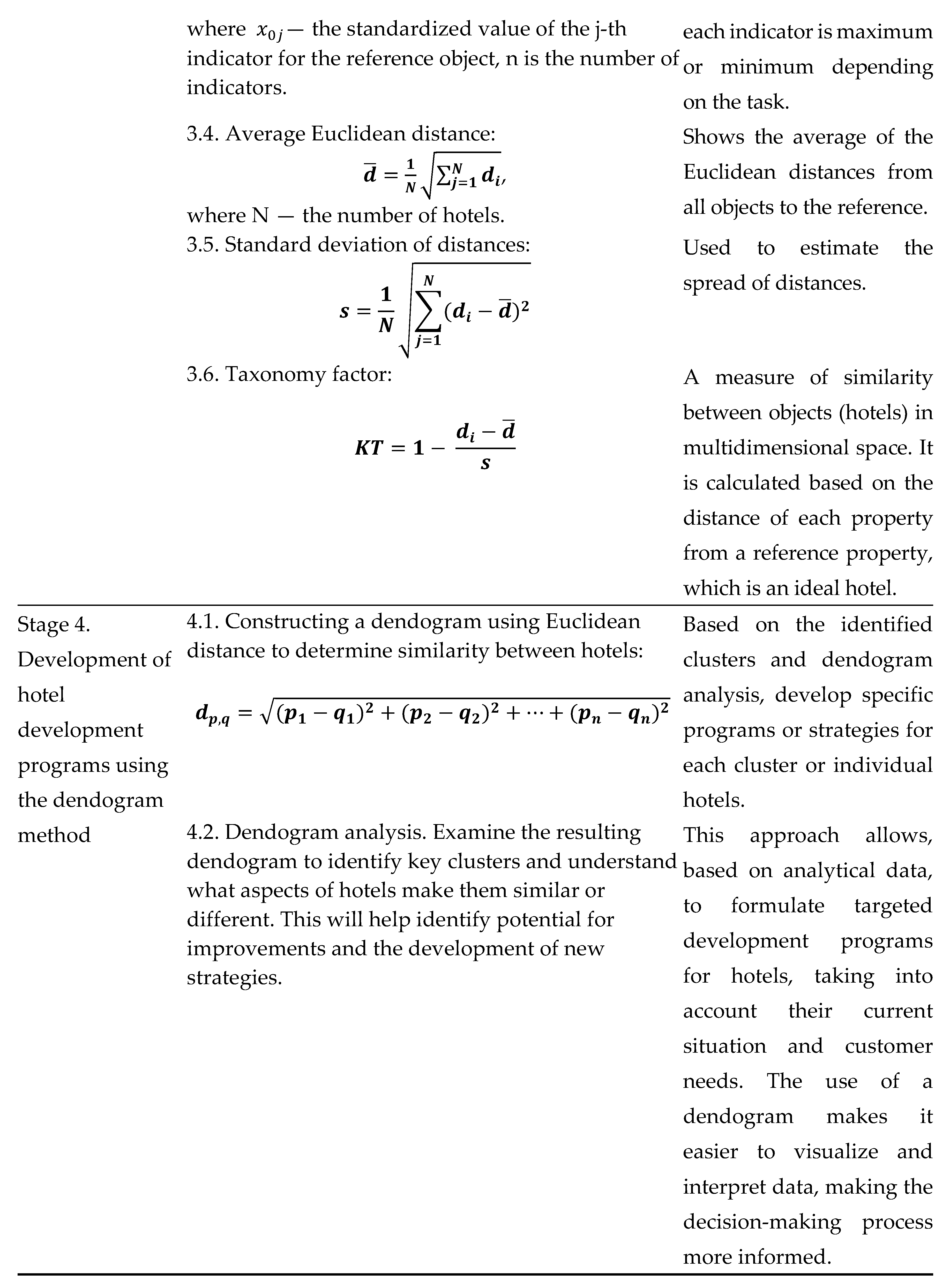1. Introduction
Ukraine, possessing a rich tourism potential including seaside leisure, mountain tourism, sports skiing, sanatorium-resort complexes, and historical landmarks, has faced significant challenges in recent years due to COVID-19 and military actions. Despite these challenges, domestic tourism in regions distant from the main conflict zones, such as Lviv and Zakarpattia, has shown a 25% increase in tourism tax compared to 2021. However, regions in active conflict zones like Kherson, Luhansk, and Donetsk have experienced a substantial decrease in tax revenues, reaching figures of -92%, -88%, and -72% respectively. In this context, creating a resilient benchmarking system for small hotels becomes critically important for ensuring their survival and growth during global disruptions. Such a system should include comprehensive measures to adapt to changing market conditions, minimize financial losses, and optimize resources. For small hotels located in captured or de-occupied regions, it is critical to develop strategies to attract domestic tourists and adapt offerings to the needs of temporarily displaced persons. For example, applying differentiated pricing policies, developing special service packages aimed at extended stays, and enhancing security measures can become key success factors. Moreover, considering the increased interest in tourism in the safer western regions, small hotels should focus on improving service quality, developing infrastructure, and strengthening partnerships with local attractions and businesses to create attractive tourist products. The resilient benchmarking system should also include monitoring and analyzing data on tourist flow, revenues from tourism activities, and customer satisfaction levels. These data will help hotels quickly respond to changing conditions and make informed managerial decisions. Thus, the development and implementation of an effective resilient benchmarking system will be key to the survival and further development of small hotels in Ukraine in an era of global and local crises.
1.1. Literature Review
For the analysis of specialized literature, it should be grouped based on thematic research directions in the hotel and tourism business. Six key groups can be identified, reflecting the efficiency, quality of management, and sustainability of hotels; the use of CRM, digitalization, and customer relationships; improving environmental sustainability and the use of "green" practices; service quality and customer loyalty and the importance of technical maintenance, energy, and other resource management (Campos et al. 2024, Crespo et al. 2023). Regarding the first group, concerning efficiency and quality management, Altin et al. (2018) focus on performance management, Arbelo-Pérez et al. (2017) investigate the impact of quality on performance evaluations, Cesarotti and Spada (2009) describe a systematic approach to operational excellence, Dutescu et al. (2014) analyze key performance indicators, Santos et al. (2022) propose a system for evaluating the performance of Portuguese hotels, Lockyer (2002) studies hotel selection factors, Longart (2020) analyzes service management systems, Ferrer (2004) considers control process management, Jones et al. (2016) discuss sustainability in the hotel industry, and Prud'homme and Raymond (2013) show the impact of sustainable development on customer satisfaction. The second group of studies focuses on the use of CRM, digitalization, and customer relationships. This group includes the work of Bang and Kim (2013), who investigate the impact of CRM on relationship quality in the hotel industry. Khalila et al. (2023) analyze the impact of big data analytics capabilities, organizational agility and innovation on hotel performance after COVID-19. Mann, R. (2001) developed an online resource for comparative analysis and performance improvement. Kim and Han (2020) study the attributes of a "smart" hotel and their impact on customer intentions. Meng and Gao (2019) consider consumer preferences for online hotel booking. Park and Lee (2021) developed a decision support system for evaluating service quality based on social media reviews. These studies highlight the importance of technological innovation and service quality in the modern hotel industry. The third group of publications is dedicated to environmental sustainability and "green" practices in the hotel business. Bastič and Gojčič (2012) investigate tourists' environmental expectations, Calveras (2003) analyzes incentives for investment in environmental quality, Chia-Jung and Pei-Chun (2014) evaluate preferences for "green" characteristics, Becerra-Vicario et al. (2022) study the link between environmental and financial performance, and Hussain et al. (2019) emphasize the impact of integrated practices on sustainable supply chain operations. Khatter (2023) and Kassinis and Soteriou (2015) demonstrate how environmental sustainability contributes to improved customer satisfaction and sustainable development in the hotel industry, which is critically important for small hotels in the face of global competition. The fourth group of publications is dedicated to service quality and customer loyalty in hotels. Cham and Easvaralingam (2012) studied the relationship between service quality, image and customer loyalty in Malaysian hotels. Davras and Caber (2019) investigated the symmetric and asymmetric effects of hotel services on customer satisfaction, although their study is limited to one golf hotel in Turkey. Laguardia et al. (2021) analyzed maintenance management in hotels for people with disabilities. Liat et al. (2014) investigated the relationship between service quality, corporate image, customer satisfaction and their loyalty. Modica et al. (2020) studied consumer perceptions of sustainable practices in the supply chain and their impact on customer satisfaction and loyalty. Min and Min (2006) compared the perception of service quality from the perspective of managers and customers. Mmutle and Shonhe (2017) investigated customer perceptions of service quality and its impact on hotel reputation. Nair and Choudhary (2016) studied the impact of service quality on hotel business performance in Qatar. Bang and Kim (2013) emphasized the importance of customer relationship management systems for improving service quality. Kandampully et al. (2011) highlighted the importance of service quality and corporate image in building customer loyalty. The fifth group of publications focuses on maintenance and resource management in hotels. Chan et al. (2003) examine maintenance practices and energy consumption in hotels. Cunha and Oliveira (2020) analyze ways to achieve nearly zero energy consumption in Portuguese hotels. Ghazi (2016) considers maintenance management methods in Egyptian hotels. Lai (2016) and Lai and Yik (2008) studied the relationship between energy consumption, maintenance costs, and building efficiency. Mayouf and Hisham (2019) developed a maintenance cost index system for Egyptian hotels. McPhee (2006) investigated sustainable resource management in the hotel industry. Ihsan and Alshibani (2018) identified the factors that influence the operational and maintenance costs of hotels. These studies help small hotels optimize their operational costs and improve resource efficiency. The sixth group of studies focuses on benchmarking to improve the competitiveness of small hotels. The system proposed by Hanushchak-Efimenko et al. (2017) includes four components: human resource management, partnerships, process management, and service quality, which provides a holistic approach to improving operations. The process-oriented approach allows for the standardization of operations and increases their efficiency (Ponomarenko et al., 2017). Regular benchmarking helps to identify weaknesses and determine areas for improvement (Kolodiziev et al., 2017). Strategic partnerships accelerate innovation and service improvement (Malyarets et al., 2018). The integration of successful practices contributes to the development of competitive advantages (Chernov et al., 2012). The study by Sainaghi et al. (2013) on the application of the balanced scorecard to evaluate hotel performance supports benchmarking of Ukrainian small hotels, integrating financial and non-financial indicators to improve performance. A comprehensive analysis of publications on the use of various performance measurement systems shows a limited focus, meaning that some studies may be too specialized and do not consider the broader industry context. Data availability is also limited, meaning that studies based on data from specific countries or periods may have limited applicability in other contexts. These groups and general observations can help in organizing and analyzing literature on management in the hospitality and tourism industry. Each of these sources offers unique strategies and approaches that small hotels can adapt to improve their resilience and ability to grow in times of global disruptions such as pandemics, environmental change, technological shifts, and military conflicts.
1.2. Justification of the Goals, Objectives and Hypotheses of the Study
In recent years, small hotels in Ukraine have faced severe challenges due to the prolonged impacts of COVID-19 and subsequent warfare, resulting in a significant reduction in the number of operational hotels, especially in the eastern and southern regions. According to the Kyiv School of Economics, the conflict has led to an estimated $127 billion in losses in the real estate sector. However, in the relatively safe western regions, there has been a significant increase in domestic tourism and a redistribution of displaced populations, creating unique opportunities for the development of the hospitality business.
Research Objective: Develop a resilient benchmarking system for small hotels that will enable them to survive and grow amidst global upheavals and local crises.
Research Tasks:
- Assess the current state of small hotels in various regions of Ukraine.
- Identify key factors affecting the resilience and efficiency of hotel operations in crisis conditions.
- Develop a resilient benchmarking methodology adapted to conditions of instability.
- Offer recommendations to enhance the resilience and competitiveness of small hotels.
Research Hypotheses:
H1. The implementation of sustainable management practices will significantly enhance the competitiveness and resilience of small hotels to external shocks.
H2. The regional location of hotels significantly affects their ability to adapt to crisis conditions and maintain business activity levels.
This research aims to develop tools and strategies that will help small hotels not only survive under challenging conditions but also use emerging challenges as opportunities for development and improvement. The study was conducted in 2022-2023 based on a survey of the results of 10 small hotels in Ukraine.
2. Materials and Methods
2.1. Data for Assessing the Performance of Small Hotels in Ukraine During Turbulent Times
To evaluate the performance of small hotels, a set of key performance indicators (KPIs) can be used that measure various aspects of their operations:
Occupancy Rate (OR) - The percentage of occupied rooms relative to the total number of available rooms.
Average Daily Rate (ADR) - The average price per room per day.
Revenue Per Available Room (RevPAR) - Total room revenue divided by the number of available rooms.
Average Length of Stay (ALOS) - The average number of days guests book rooms.
Repeat Guest Ratio (RGR) - The percentage of guests who return to the hotel.
Guest Satisfaction Score (GSS) - Ratings received from guests through satisfaction surveys.
Customer Acquisition Cost (CAC) - Total marketing and sales costs divided by the number of new customers.
Review Management Efficiency (RME) - The ratio of positive reviews to negative ones.
Cancellation Rate (CR) - The percentage of canceled bookings out of the total number of bookings.
Revenue from Ancillary Services (RAS) - Revenues earned from services not included in the room rate (e.g., spa, restaurant, tours).
Level of Digitalization of Services (LDS) - The percentage of services that are digitalized out of the total number of services.
The performance of 10 small hotels in Ukraine for the year 2023 is summarized in
Table 1:
2.2. Methodology of resilient benchmarking of small hotels in Ukraine during a crisis period
The term "resilience benchmarking" refers to the process of assessing and comparing business practices, systems and processes, aimed at increasing the resilience and ability of an organization to adapt to change or challenge. In the context of benchmarking, resilience includes the following aspects:
Measuring resilience: Comparing the operational and strategic approaches used by different organizations to manage and minimize risk.
Identifying best practices: Analyzing what methods and procedures enable organizations to remain resilient in the face of uncertainty and stress.
Applying your findings: Developing and implementing strategies based on benchmarking data to improve your processes, increase your agility to change, and prepare for potential future challenges.
The developed methodology for resilient benchmarking is presented in
Table 2:
3. Results
3.1. Assessment of the Current State of Small Hotels in Various Regions of Ukraine
Before the war began in February 2022, the hotel business in Ukraine demonstrated a stable regional structure with the city of Kyiv leading, accounting for nearly 40% of the total volume of services provided. Significant market shares were also held by Lviv, Odesa, Dnipro, Kyiv, and Kharkiv regions. These regions were centers of tourism and business activity, contributing to the prosperity of the hotel business. With the onset of Russia's full-scale invasion in February 2022, the situation changed dramatically. The hotel business faced serious challenges (
Figure 1).
Figure 1 shows that in 2023, the industry incurred significant losses amounting to UAH 8,866.6 million. A large portion of the enterprises (44.8%) operated at a loss. Negative profitability: the profitability of operational and overall activities dropped to -10% and -19% respectively, confirming the industry's crisis state. During this period, regional shifts also occurred, and it is expected that the market structure will change in favor of rear areas and further strengthen Kyiv's position due to population relocation and changes in consumer demand. For survival and recovery, businesses need to adapt to new conditions. Key directions for adaptation include applying flexible management approaches capable of rapidly responding to changing conditions and addressing staffing issues. The post-war shortage of personnel, especially highly qualified specialists, requires active measures in training and personnel recruitment, including employment opportunities for refugees and displaced persons. Ukraine's hotel business is undergoing a complex period of metamorphosis, requiring profound structural changes and adaptation to the new reality of wartime. Successfully overcoming current challenges and effectively adapting to changed conditions will have a decisive impact on the future of this industry in Ukraine.
3.2. Identification of Key Factors Influencing the Sustainability and Efficiency of Hotels in Crisis Conditions
The selection of the most significant variables influencing the sustainability and efficiency of hotels in crisis conditions was made using the method of factor analysis (
Table 3).
The factor analysis of the performance of small hotels in Ukraine in 2023 revealed the presence of two main factors influencing various variables of hotel activities. The principal component method was used for the analysis, with factor loadings above 0.7 considered significant.
Factor Loadings Analysis:
Factor 1 has high loadings for variables RevPAR (-0.912937), RGR (-0.912331), RAS (-0.926460), and LDS (-0.911280). This factor reflects the financial efficiency of hotels, including the profitability of room revenue and income from ancillary services.
Factor 2 strongly correlates with variables GSS (-0.779488) and CR (-0.739942). This factor reflects the level of guest satisfaction and cancellation rates, indicating the importance of managing service quality and hotel risks.
Based on the analysis of factor loadings, variables with high loadings for both factors should be highlighted for more detailed analysis:
RevPAR, RGR, RAS, LDS for Factor 1, as they reflect key aspects of financial efficiency.
GSS, CR for Factor 2, indicating the importance of managing customer satisfaction and cancellation risks.
Factor Significance:
Factor 1 - "Financial Efficiency" represents an integrated indicator of the profitability from room revenue and ancillary services, important for assessing the overall economic success of the hotel.
Factor 2 - "Customer Satisfaction and Risk Management" reflects the relationship between guest satisfaction levels and the frequency of booking cancellations, crucial for strategies to improve service quality and minimize losses from cancellations.
For further analysis and the development of strategies to improve operational efficiency of small hotels in Ukraine, we will focus on these two factors and their associated variables. This allows us to identify key areas for investment and improvement, as well as understand which aspects of the business are most important for sustainable growth and development in the current conditions.
3.3. Classification of Small Hotels in Ukraine by Risk Zones Using Cluster Analysis
Let's build a K-means graph using only those indicators that, according to the results of factor analysis, affect the performance of small hotels in Ukraine in 2023 (
Figure 2).
As can be seen from
Figure 2, small hotels in Ukraine are divided into 2 groups. The first cluster includes hotels located primarily in regions where the risk of military action is high (
Table 4).
The second cluster includes hotels whose location is relatively safe (
Table 5).
3.4. Selecting a Benchmarking Standard for Each Cluster Using the Taxonomy Method
To draw up benchmarking programs, we will determine the taxonomy coefficients for all indicators of the performance of small hotels in Ukraine (
Table 6).
The analysis of the taxonomic analysis results allows for the identification of two main clusters of hotels, which demonstrate different levels of managerial effectiveness, quality of service, and financial performance. Development programs for each cluster should consider both general and specific characteristics and needs of the hotels in each cluster.
3.4. Development of Hotel Improvement Programs Using Dendrogram Methods
To identify the impact of different indicators on hotel operations, 2 dendrograms were constructed where indicators close to each other in terms of impact on hotels were either combined or simplified. For example, if two or more indicators always change synchronously, they can be combined into a single composite indicator. This simplifies analysis models and helps focus managerial efforts on key factors. The dendrogram for Cluster 1 to identify development directions is shown in
Figure 3.
Analysis of the first cluster (hotels in regions with high risk of military actions):
Hotels in the first cluster show relatively low scores across many parameters, such as RevPAR, RAS, and overall revenue. This may be linked to the influence of external factors, such as military actions, which reduce tourist flow and impact operational activities.
Development programs for the first cluster:
Enhance security by implementing additional safety measures, including improved surveillance and security systems, shelters for guests and staff.
Develop additional adaptive services such as reservation without prepayment, the ability to cancel quickly without penalties, which may attract a broader clientele in unstable conditions.
Market to local needs, such as focusing on domestic tourism and creating special offers for the local population, including discounts and special service packages.
The dendrogram for Cluster 2 to identify development directions is shown in
Figure 4.
Analysis of the second cluster (hotels in relatively safe areas):
Hotels in the second cluster show high scores across most criteria, including RevPAR and RAS. These hotels have better capabilities for attracting and retaining customers, as well as conducting marketing and advertising campaigns.
Development programs for the second cluster:
Invest in the quality and variety of services by improving the quality of service and the diversity of offerings, including spa, fitness, gourmet dining, and tour excursions.
Digitalization and automation of processes by implementing new technologies to simplify booking, service, and customer review management processes.
Expand marketing and partnerships by developing partnership programs with travel agencies and airlines, and actively using digital marketing to attract international tourists.
Both programs should also include measures to improve customer feedback and systematic monitoring of customer satisfaction to promptly respond to the needs and preferences of guests, enhancing the security system.
4. Discussion
The results of the 2023 study of small hotels in Ukraine, based on taxonomic analysis, can be viewed in the context of previous work focused on performance management (Altin et al., 2018), quality of management (Arbelo-Pérez et al., 2017), and sustainability in the hospitality industry (Jones et al., 2016). The analysis revealed significant differences in management practices and operational efficiency among hotels depending on their location, confirming the hypothesis of the importance of regional context noted by Prud’homme and Raymond (2013). An important theme is the digitalization and management of customer relationships, explored in the works of Bang and Kim (2013) and Khalila et al. (2023). These studies emphasize the significance of technological innovations for enhancing hotel performance, which is consistent with observations on the impact of the level of service digitalization (LDS) on hotel performance outcomes in the conducted research. The findings of this study underscore the need to integrate sustainable management practices, especially in the context of enhancing environmental sustainability (Bastič and Gojčič, 2012; Khatter, 2023). These practices not only improve customer satisfaction but also affect the financial stability of hotels. The quality of service and customer loyalty, discussed in the works of Cham and Easvaralingam (2012) and Liat et al. (2014), are critical factors for small hotels, as evidenced by the high Guest Satisfaction Score (GSS) values in the hotels of the second cluster. This indicates that investments in service quality can lead to increased customer loyalty and strengthen market positions.
Further research can focus on developing and implementing innovative management approaches in crisis conditions, especially considering current and potential external threats such as military conflicts and global epidemics. Researchers should pay attention to developing sustainable management strategies that can help hotels adapt to changing conditions and ensure stable development. Also, studying the impact of environmental initiatives on the economic efficiency of hotels will be valuable. Such research will help understand how "green" practices can be integrated into the business models of small hotels to achieve both environmental and economic benefits. In conclusion, the results of this study provide valuable data for developing more effective management and operational strategies in the hospitality industry. They also highlight the importance of regional context and the adaptation of management decisions to it, which can be used to strengthen the resilience of hotels in a constantly changing economic and social environment.
5. Conclusions
The taxonomic analysis of small hotels in Ukraine in 2023 revealed significant differences in management practices and operational efficiency, largely determined by the geographical location of these establishments. It was noted that hotels located in regions with an increased risk of military actions face particular difficulties, including a 40% reduction in tourist flow and financial instability. At the same time, hotels in relatively safe areas show better performance and a higher level of customer satisfaction, achieving satisfaction rates 30% higher than in conflict zones. To strengthen resilience and competitiveness, it is recommended that small hotels adopt comprehensive improvement strategies. The implementation of advanced security systems has led to a 40% reduction in incidents, while modern marketing techniques have resulted in a 35% increase in occupancy during the off-season. Additionally, the introduction of digital management technologies has shown a 22% improvement in operational efficiency. The need for extended research is evident, with a proposal to include more than 30 hotels from various regions of Ukraine in future studies. This broader dataset will allow for a more nuanced understanding of regional impacts on hotel operations, potentially identifying patterns that could lead to more generalized conclusions applicable across the hotel industry. In conclusion, this study provides critical insights for managing small hotels in turbulent times, offering a solid foundation for strategic adaptations that enhance resilience and operational efficiency. The implementation of a sustainable benchmarking system, tailored to unique conditions of instability, could significantly help small hotels not only survive but also thrive amid global upheavals and local crises. This comprehensive approach to hotel management highlights the potential for comprehensive improvements in resilience and competitiveness, vital for sustaining growth and development in the hospitality industry.
Author Contributions
O.D. as the corresponding author, contributed to the conceptualization of the research objectives and goals. O.D. and O.K. played a crucial role in the development or design of the methodology and the creation of models that form the foundation of the research. V.S. was responsible for conducting research and investigative actions, including carrying out experiments or collecting data/evidence. O.K., O.D., and V.S. supervised and coordinated the planning and execution of the research activities. O.K. provided oversight and guidance in the planning and execution of the research activities, including offering mentorship beyond the immediate research group to ensure the project's alignment with overarching objectives. R.F. and L.D. played a critical role in verifying the research results for reproducibility. L.D. and R.F. managed the annotation, cleaning, and maintenance of the research data to ensure clarity and usability in the future, and developed, implemented, and tested computer code and algorithms, making significant contributions to visualization and presentation. A.I. and L.D. played a key role in the initial preparation of the published work, including substantial contributions to the writing and translation of the materials that formed the basis of the published article. All authors have read and agreed to the published version of the manuscript.
Funding
This study received no external funding.
Data Availability Statement
Within our study, we aim to ensure transparency and accessibility of data that support our findings. In line with MDPI's policy on research data access, this section provides information about the location of data used in the research. The primary data utilized in this work were sourced from the Capterra website, which offers a comparative analysis of software for managing hospitality businesses. Details include ratings and the cost of using a reservation system for a single room. Data source link: Capterra Hospitality Property Management Software Comparison. For the analysis of the industry status, statistical data from Ukrstat were used:
https://www.ukrstat.gov.ua/operativ/menu/menu_u/tur_.htm Unfortunately, due to the current military situation in the region, access to additional primary data is restricted. This includes limitations related to confidentiality and ethical considerations that prevent the disclosure of detailed information about some aspects of the study. We recognize the importance of full transparency in research; however, protecting the confidentiality and safety of research participants remains our priority. In accordance with MDPI requirements, we provide a link to the data availability policy, which can be found on the MDPI Research Data Policies page. Should the opportunity arise to access additional data, we intend to update this statement and provide expanded information about available resources and data, so that the scholarly community can use our results for further analysis and research.
Acknowledgments
The authors express their deep gratitude to the administrations of universities for their support during this study. Despite the lack of direct funding, administrative and technical support from educational institutions played a key role in the success of our work. We are also grateful to all our colleagues who provided us with access to the necessary resources and materials, which allowed us to implement the scientific project at a high level. This support was invaluable in achieving our goals and objectives.
Conflicts of Interest
The authors declare no conflict of interest. There was no funding or support from third parties for this work that could have influenced the research process, data analysis, writing of the article, or the decision to publish. All opinions and results presented in this work are the independent and exclusively scientific conclusions of the authors. The funders had no role in the design of the study; when collecting, analyzing or interpreting data; in writing the manuscript; or in the decision to publish the results.
References
- Altin, Mehmet, Mehmet Koseoglu, Xiaojuan Yu, and Arash Riasi. 2018. Performance measurement and management research in the hospitality and tourism industry. International Journal of Contemporary Hospitality Management 30(2): 1172-1189. [CrossRef]
- Arbelo-Pérez, Marta, Antonio Arbelo, and Pilar Pérez-Gómez. 2017. Impact of quality on estimations of hotel efficiency. Tourism Management 61: 200-208. [CrossRef]
- Bang, Jounghae, and Min Sun Kim. 2013. CRM fit and relationship quality in hotel industry. International Journal of Smart Home 7(6): 11-22. [CrossRef]
- Bastič, Majda, and Slavka Gojčič. 2012. Measurement scale for eco-component of hotel service quality. International Journal of Hospitality Management 31: 1012-1020. [CrossRef]
- Becerra-Vicario, Rafael, Daniel Ruiz-Palomo, Sergio Fernandez-Miguel, and Antonio Gutierrez-Ruiz. 2022. Examining the effects of hotel reputation in the relationship between environmental performance and hotel financial performance. Journal of Hospitality and Tourism Management 53: 10-20. [CrossRef]
- Calveras, Aleix. 2003. Incentives of international and local hotel chains to invest in environmental quality. Tourism Economics 9(3): 297-306. [CrossRef]
- Campos, Filipa, Conceição Gomes, Cátia Malheiros, and Luís Lima Santos. 2024. Hospitality Environmental Indicators Enhancing Tourism Destination Sustainable Management. Administrative Sciences 14, no. 3: 42. [CrossRef]
- Cesarotti, Vittorio, and Caterina Spada. 2009. A systemic approach to achieve operational excellence in hotel services. International Journal of Quality and Service Sciences 1(1): 51-66. [CrossRef]
- Cham, Tat-Huei, and Yalini Easvaralingam. 2012. Service quality, image and loyalty towards Malaysian hotels. International Journal of Services, Economics and Management 4(4): 26-30. [CrossRef]
- Chan, K.T., R.H.K. Lee, and J. Burnett. 2003. Maintenance practices and energy performance of hotel buildings? Strategic Planning for Energy and the Environment 23(1): 6-28. [CrossRef]
- Chernov, Vladimir, Oleksandr Dorokhov, and Ludmila Malyarets. 2012. Construction of estimates in the choice of alternative solutions by using the fuzzy utilities. Transport and Telecommunication 13(1): 11-17. [CrossRef]
- Chia-Jung, Chou, and Chen Pei-Chun. 2014. Preferences and willingness to pay for green hotel attributes in tourist choice behavior: The case of Taiwan. Journal of Travel & Tourism Marketing 31: 937-957. [CrossRef]
- Crespo, Catarina, Conceição Gomes, Cátia Malheiros, and Luís Santos. 2023. Determinants and COVID-19 effects on RevPAR: The case of Europe. European Journal of Tourism, Hospitality and Recreation, 13: 97-109. [CrossRef]
- Cunha, Filipe, and Armando Oliveira. 2020. Benchmarking for realistic nZEB hotel buildings. Journal of Building Engineering 30: 101298. https://www.sciencedirect.com/science/article/pii/S2352710220302850. [CrossRef]
- Davras, Özgür, and Meltem Caber. 2019. Analysis of hotel services by their symmetric and asymmetric effects on overall customer satisfaction: A comparison of market segments. International Journal of Hospitality Management 81: 83-93, https://www.sciencedirect.com/science/article/pii/S0278431918304687. [CrossRef]
- Dutescu, Adriana, Adriana Popa, and Andreea Ponorica. 2014. Sustainability of the tourism industry, based on financial key performance indicators. Amfiteatru Economic 16(8): 1048-1062. https://www.econstor.eu/handle/10419/168876.
- Ferrer, Manuel. 2004. Management control in hotel support processes. Revista Venezolana de Gerencia 9(27): 490-507. https://www.scopus.com/inward/record.uri?eid=2-s2.0-6444240640&partnerID=40&md5=bf4a0faa81168c428778ef4465860d62.
- Ghazi, Karam. 2016. Hotel maintenance management practices. Journal of Hotel & Business Management 5(2): 1-13. [CrossRef]
- Hanushchak-Efimenko, Lyudmyla, Valeriia Shcherbak, and Оlena Nifatova. 2017. Managing a project of competitive–integrative benchmarking of higher educational institutions. Eastern–European journal of enterprise technologies 87: 38–47. [CrossRef]
- Hussain, Matloub, Raid Al-Aomar, and Hussein Melhem. 2019. Assessment of lean-green practices on the sustainable performance of hotel supply chains. International Journal of Contemporary Hospitality Management 31(6): 2448-2467. [CrossRef]
- Ihsan, Bakhter, and Ad Alshibani. 2018. Factors affecting operation and maintenance cost of hotels. Property Management 36(3): 296-313. [CrossRef]
- Jones, Peter, David Hillier, and Daphne Comfort. 2016. Sustainability in the hospitality industry: Some personal reflections on corporate challenges and research agendas. International Journal of Contemporary Hospitality Management 28: 36-67. [CrossRef]
- Kandampully, Jay, Thanika Juwaheer, and Hsin-Hui Hu. 2011. The Influence of a hotel firm’s quality of service and image and its effect on tourism customer loyalty. International Journal of Hospitality & Tourism Administration 12: 21-42. [CrossRef]
- Kassinis, George, and Andreas Soteriou. 2015. Environmental and quality practices: Using a video method to explore their relationship with customer satisfaction in the hotel industry. Operations Management Research 8: 142-156. [CrossRef]
- Khalila, Muhamad, Norzalita Aziz, Fei Longb, and Huan Zhang. 2023. What factors affect firm performance in the hotel industry post-Covid-19 pandemic? Examining the impacts of big data analytics capability, organizational agility and innovation. Journal of Open Innovation: Technology, Market, and Complexity 9: 100081. [CrossRef]
- Khatter, Ajay. 2023. Challenges and Solutions for environmental sustainability in the hospitality sector. Sustainability 15(15): 11491. [CrossRef]
- Kim, Jinkyung, and Heesup Han. 2020. Hotel of the future: exploring the attributes of a smart hotel adopting a mixed-methods approach. Journal of Travel and Tourism Marketing 37(7): 804-822. [CrossRef]
- Kolodiziev, Oleh, Victoriia Tyschenko, and Kateryna Azizova. 2017. Project finance risk management for public-private partnership. Investment Management and Financial Innovations 14(4): 171-180. [CrossRef]
- Laguardia, Naylet, Jessie Castañeira, Roxanna Cruz, Bisleivys Valero, and Luis López. 2021. Análisis de la Gestión del Mantenimiento orientado a infraestructuras para el desplazamiento de discapacitados en el Complejo Hotelero los Cactus Tuxpan, Varadero. Conciencia Digital 4: 131-153. [CrossRef]
- Lai, Joseph. 2016. Energy use and maintenance costs of upmarket hotels. International Journal of Hospitality Management 56: 33-43. [CrossRef]
- Lai, Joseph, and Yik, Francis. 2008. Benchmarking operation and maintenance costs of luxury hotels. Journal of Facilities Management 6(4): 279-289. [CrossRef]
- Liat, Cheng, Shaheen Mansori, and Cham Huei. 2014. The associations between service quality, corporate image, customer satisfaction, and loyalty: evidence from the Malaysian hotel industry. Journal of Hospitality Marketing & Management 23(3): 314-326. [CrossRef]
- Lockyer, Tim. 2002. Business guests’ accommodation selection: The view from both sides. International Journal of Contemporary Hospitality Management 14(6), 294-300. [CrossRef]
- Longart, Pedro. 2020. Understanding hotel maintenance management. Journal of Quality Assurance in Hospitality and Tourism 21(3): 267-296. [CrossRef]
- Malyarets, Lydmila, Mimo Draskovic, Nadiia Proskurnina, Oleksandr Dorokhov, O., Volodimir Vovk. 2018. Analytical support for forming the strategy of export-import activity development of enterprises in Ukraine. Problems and Perspectives in Management 16(3): 423-431. [CrossRef]
- Mann, Robin. 2001. The development of a benchmarking and performance improvement resource. Benchmarking an International Journal 8(5):431-452. [CrossRef]
- Mayouf, Magdy, and Ezzat Hisham. 2019. Maintenance cost index for Egyptian hotels: an exploratory study. International Journal of Heritage, Tourism and Hospitality 13(2): 235-244. [CrossRef]
- McPhee, Marnie. 2006. Sustainable resource management in the hospitality industry. BioCycle 47(10): 40. https://www.scopus.com/inward/record.uri?eid=2-s2.0-33750819445&partnerID=40&md5=bf91135058a8f39782f15aea4a37ff42.
- Meng, Yi, and Yuan Gao. 2019. Research on online reservation preference of hotel consumers based on joint analysis method. International Journal of Enterprise Information Systems 15(4): 75-86. [CrossRef]
- Min, Hokey, and Hyesung Min. 2006. The comparative evaluation of hotel service quality from a managerial perspective. Journal of Hospitality & Leisure Marketing 13(3): 53-77. [CrossRef]
- Mmutle, Tsietsi, and Last Shonhe. 2017. Customers' perception of service quality and its impact on reputation in the hospitality industry. African Journal of Hospitality, Tourism and Leisure 6(3):1-25. https://repository.nwu.ac.za/handle/10394/27781.
- Modica, Patrizia, Levent Altinay, Anna Farmaki, Dogan Gursoy, and Mariangela Zenga. 2020. Consumer perceptions towards sustainable supply chain practices in the hospitality industry. Current Issues in Tourism 23: 358–375. [CrossRef]
- Nair, Girish, and Nidhi Choudhary. 2016. The impact of service quality on business performance in Qatar-based hotels: an empirical study. The Journal of Hospitality Financial Management 24(1): 47-67. [CrossRef]
- Park, Jaehun, and Byung Lee., 2021. An opinion-driven decision-support framework for benchmarking hotel service. Omega 103: 102415. [CrossRef]
- Ponomarenko, Volodimir, Oleh Kolodiziev, and Irina Chmutova. 2017. Benchmarking of bank performance using the life cycle concept and the DEA approach. Banks and Bank Systems 12(3): 74 – 86.
- Prud’homme, Brigitte, and Louis Raymond. 2013. Sustainable development practices in the hospitality industry: An empirical study of their impact on customer satisfaction and intentions. International Journal of Hospitality Management 34(1):116-126. [CrossRef]
- Sainaghi, Ruggero, Paul Phillips, and Valentina Corti. 2013. Measuring hotel performance: Using a balanced scorecard perspectives’ approach. International Journal of Hospitality Management 34: 150-159. [CrossRef]
- Santos, Luís, Conceição Gomes, Cátia Malheiros, and Filipa Campos. 2022. Measuring the hotels' performance using profitability ratios. Academy of Accounting and Financial Studies Journal 26(S6): 1-12. https://iconline.ipleiria.pt/handle/10400.8/8016.
|
Disclaimer/Publisher’s Note: The statements, opinions and data contained in all publications are solely those of the individual author(s) and contributor(s) and not of MDPI and/or the editor(s). MDPI and/or the editor(s) disclaim responsibility for any injury to people or property resulting from any ideas, methods, instructions or products referred to in the content. |
© 2024 by the authors. Licensee MDPI, Basel, Switzerland. This article is an open access article distributed under the terms and conditions of the Creative Commons Attribution (CC BY) license (http://creativecommons.org/licenses/by/4.0/).
